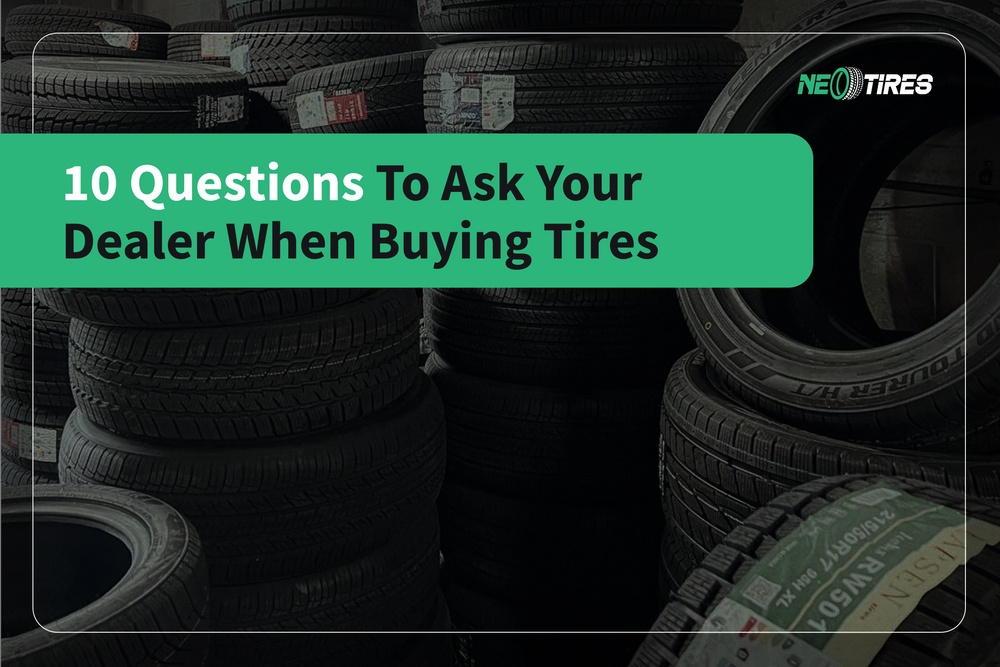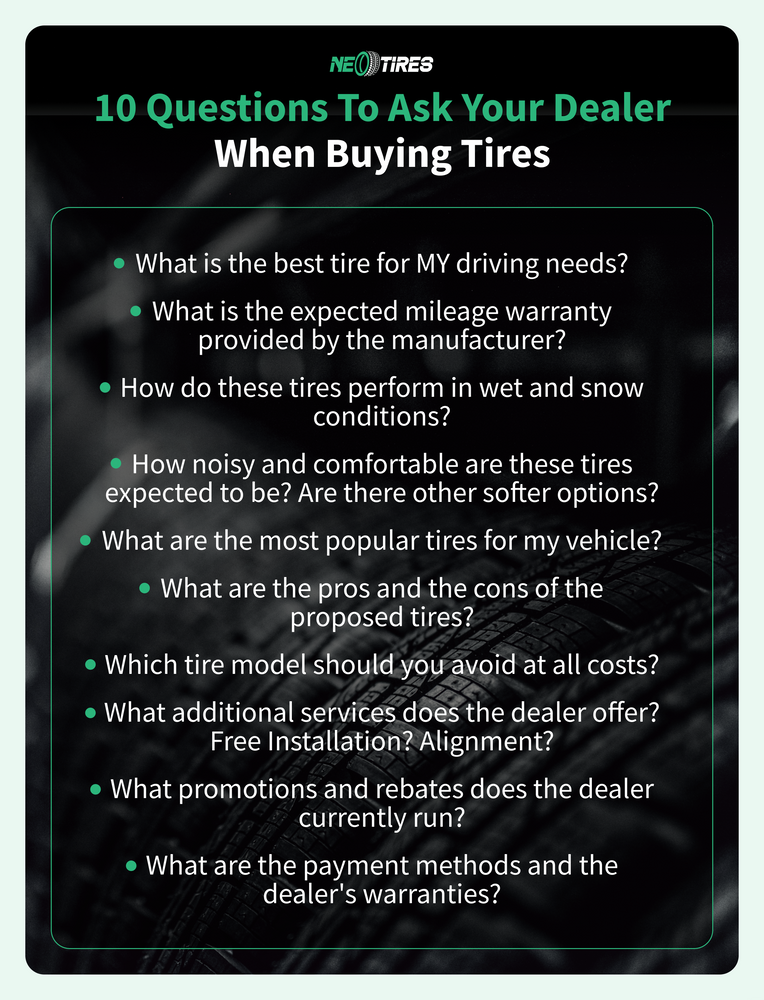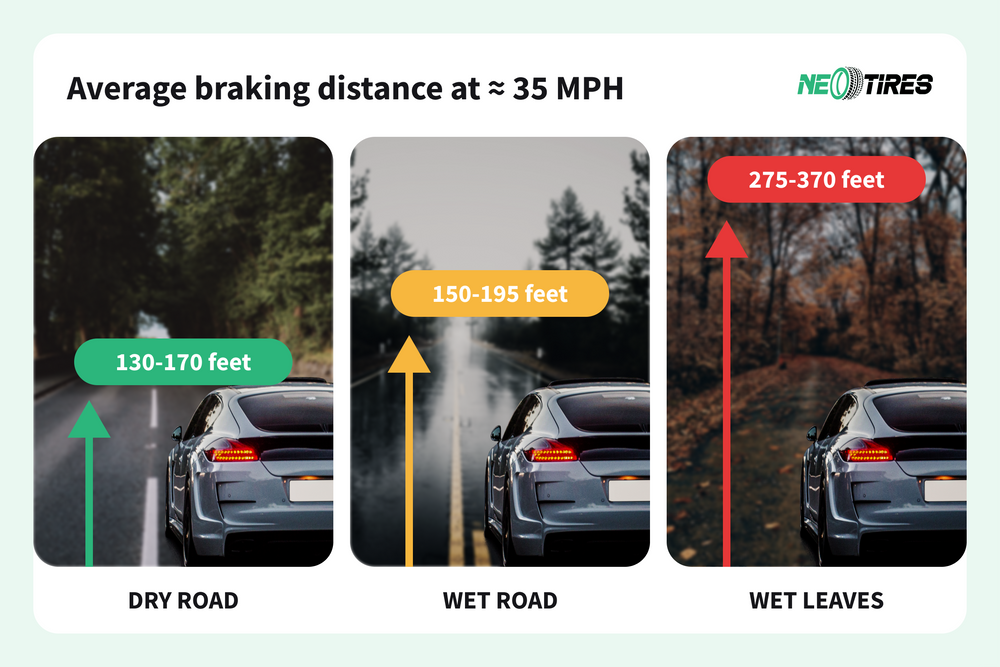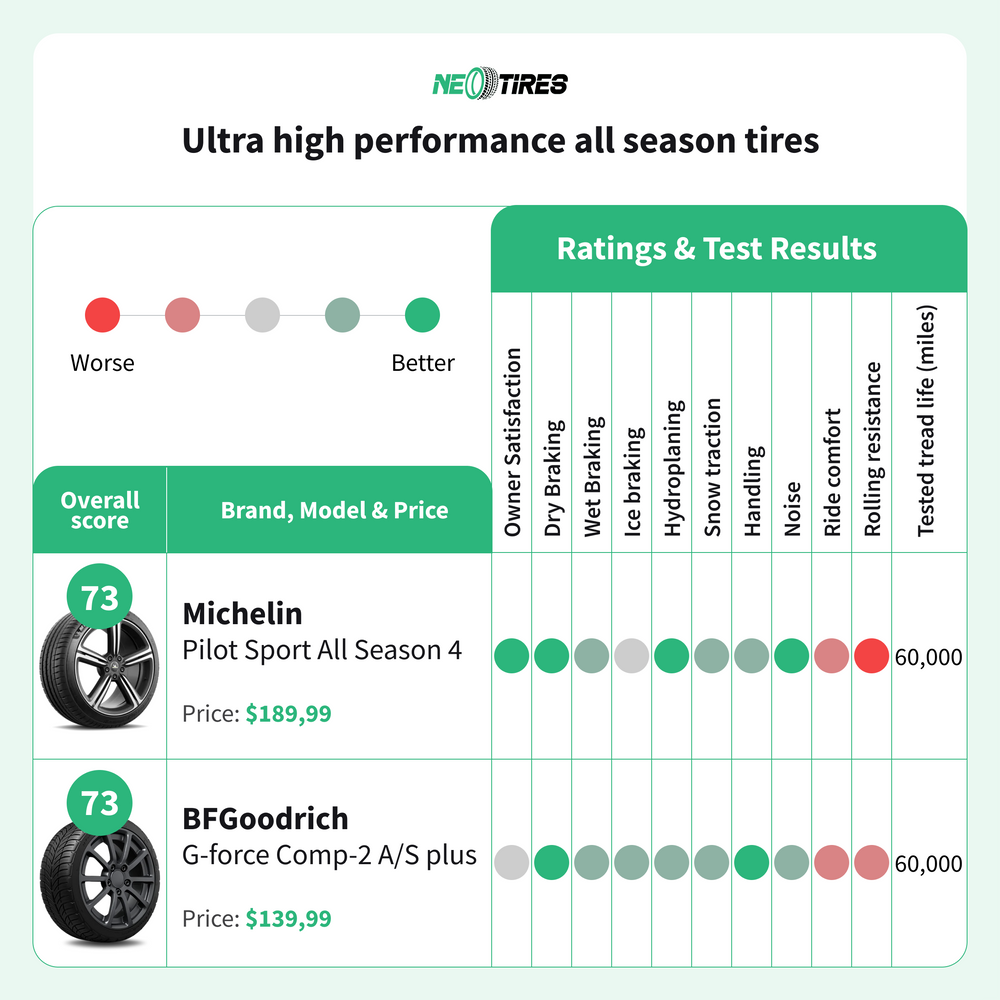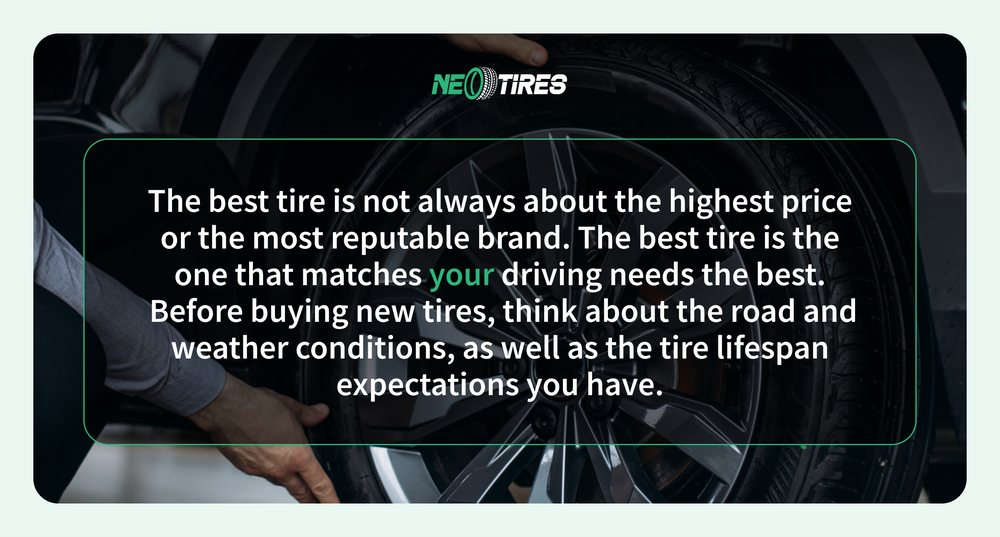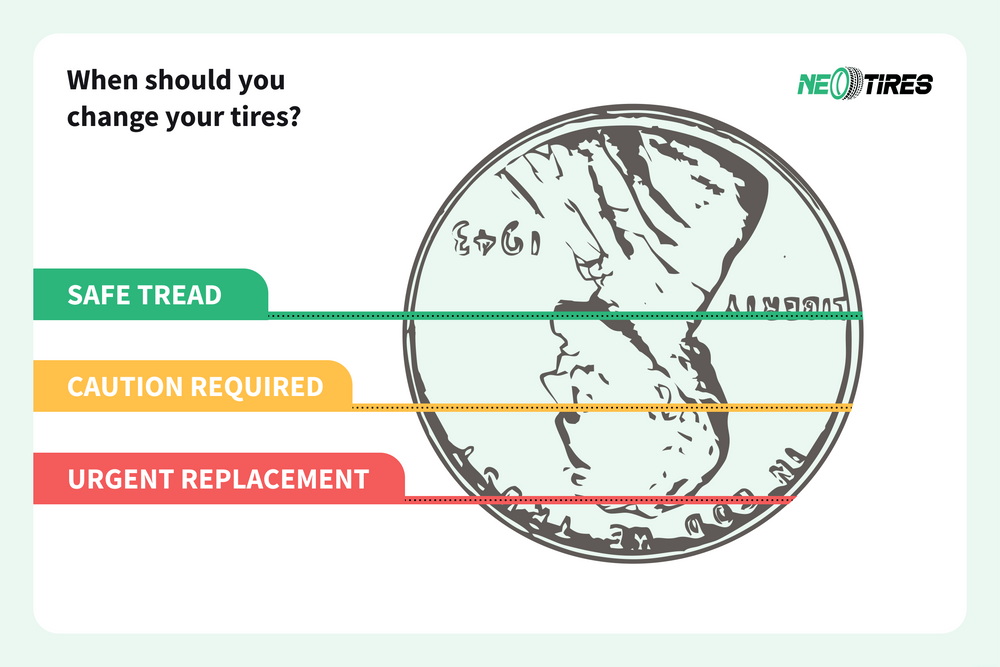Did you know that there is a "right way" to buy the right tires for you? Tires are the first line of defense when you drive on the road and if you don't choose them correctly, you have a good chance of turning your driving into a poor experience.
The tire industry offers thousands of products. Each of them has a plethora of advantages. However, you'll need to make sure that each tire's advantages match YOUR driving needs. Otherwise, even the best product on the market will leave you with a bitter taste if you choose it without taking into account some important aspects. So, what questions should you ask the dealer when choosing new tires? These might not guarantee 100% success, but they for sure will bring you closer to the right tires.
Before presenting the checklist of the 10 questions, I would like to remind you how important it is for YOU to set up the rules of the game in the buying process. In many cases, drivers rely on dealers' knowledge and trust them when dealers propose one product or another. That's just great when you can account for a professional tire dealer. The threat, however, lies in the fact that many dealers praise certain products without first asking "What exactly do YOU need? What are YOUR driving conditions? What do YOU prioritize in your tires?"
Without these questions, you might get the best product from the industry, but it might NOT match your personal needs. So, you've got to do your homework and empathically "attack" your dealer with these 10 questions. These will increase the probability of finding the right tires that suit your driving needs, your wallet, and your expectations. Saying no more, here is our table of contents:
What Should You Ask Your Dealer When Buying New Tires?
Questions To Ask When Buying Tires
1. What Is The Best Tire For My Driving Needs?
Why is this question important? Because it will automatically filter the products you don't need. Normally, the dealer should ask you to tell more about your driving needs. This narrows down all the available products to those that match your necessities.
Ignoring this question, the dealer might want to talk about the best tires for daily commuting like Hankook Ventus V2, for example. And this model is indeed a great tire for this purpose. But what if you don't need daily commuting but off-road adventures? Once you broach the subject of your particular needs, the dealer will tell you about the BFGoodrich All-Terrain T/A KO2, for instance, which is much more suitable for off-road performance.
The advantage of this question is that the dealer will propose some suitable options specifically for your needs, and not about what he thinks is appropriate. This brings you closer to those tires that will satisfy you in all aspects of performance and safety.
At this step, I recommend that you prepare in advance and estimate the driving conditions you plan. Is it about snowy conditions? Rocky? Wet or dry? All these details will help the dealer to aim for the right product from the multitude of available products.
2. What Is The Mileage Warranty Provided By The Manufacturer?
Why is this question important? Because it will help you estimate the value of your tire investment. Suppose you find a tire product that seems impressively affordable. The first impulse might be not to lose the deal as the price might seem really attractive to you. And what if the product warranty barely reaches half of the warranties offered by other manufacturers? Is it really a good deal?
So, your purpose is to find a long-lasting product. You don't want to pay for a set of tires that will wear out after the first 2 years. What you want is for the tire to serve at least 5-7 years without losing much of its performance. As such, the price of the tire should not be the basic selection criterion. It is wiser to choose durable tires so that the investment makes sense. Sometimes, even expensive tires can have a short warranty period. So, leave room to analyze various offers to see which product is the most reasonable from a price/warranty perspective.
3. How Do Tires Perform In Wet And Snow Conditions?
Why is this question important? Because great products generally perform greatly in various conditions. Considering that weather conditions can change in the area where you live, your tires should be prepared for any scenario to bring you home safe and sound.
This question is even more valuable if you are comparing different products. Knowing the tires' versatility in various conditions, the decision on a certain product can change. For example, suppose you are targeting a set of all-season tires. These do pretty well in mild weather conditions. But, what if the area where you live is characterized by occasional but heavy snow? In that case, maybe it is more reasonable to opt for an all-weather tire. The price difference is extremely small, but you gain a substantial safety asset, as all-weather tires are phenomenally competent for harsh snow weather., while all-season tires are not always the best decision.
The same rule applies in the case of wet conditions. The tires are prone to hydroplaning and can make the braking distance much longer in wet weather. You might want your tires to perform as stably as possible in such wet conditions. So, from the options recommended by the dealer, choose the one that manifests itself best under these conditions. You never know when it starts to rain cats and dogs.
4. How Noisy And Comfortable Are Tires Expected To Be?
Obviously, safety is the most essential criterion we look for in our tires. However, why not opt for superior comfort in addition to safety? Tire makers put a lot of effort into manufacturing technologies to make them as smooth and quiet as possible. As such, you just have to pick the right product that includes these advantages. But if you don't ask the dealer about it, he might mistakenly decide that this criterion is not a priority for you.
The advantage of this information is that it will help you find tires that make your driving as comfortable as possible. After all, we all spend a lot of time behind the wheel and long-term discomfort and noise could be a real problem. Whenever we drive, we all embrace the ride smoothness, especially on uneven roads, as well as driving quietness.
This is an aspect you have to talk to your dealer about. Sometimes, for just a few extra bucks you can get tires with plenty of technologies aimed at improving comfort and noise-suppressing properties, among other benefits.
5. What Are The Most Popular Tires For My Vehicle?
Why is this question important? Because it broadens your horizons and suggests industry trends. It's not always the best idea to buy what the majority of the crowd buys, I must admit. Still, you must take this information as a comparison criterion and adopt a critical analysis. For example, you might have thought about a certain product. Knowing which is the most popular product from the same class would help you compare them and decide which one is more advantageous for you.
At this point, I would also suggest that you don't jump right into the most popular tires before balancing them with your specific needs. I recommend having an analytical attitude and going into the details of different tires. Thus, you will understand if a popular tire is indeed good for your unique driving habits and conditions. Also, try to identify the WHYs behind the most popular tires. Chances are that these combine several benefits that might suit your needs.
Let's take an example to better get the idea. Suppose you are looking for a set of UHP all-season tires. Look at the image below where I compared two of the best products in the market according to Consumer Reports.
The point is that both of these products have the same overall performance score. Still, what sets them apart is the scoring for some individual performance aspects.
For instance, Michelin is better in its noise suppression properties while the
6. What Are The Pros And Cons Of The Proposed Tires?
Let's assume that you have reached a mutual agreement with your dealer regarding a certain product. Let it be the Michelin Defender LTX Platinum, for a more exemplified context. While this model might seem a great deal for your needs, you must ask about its shortcomings.
There is no perfect tire that covers it all. Sometimes, tire makers have to sacrifice a certain performance aspect in favor of another. Knowing the potential downsides of a tire makes you more prepared for your new experience of driving with new tires.
Returning to our Michelin Defender LTX Platinum example, it is difficult to find any flaws in it, because the product indeed excels in most aspects. However, this tire is not 3PMSF tire certified, which limits its serviceability in harsh snow conditions. In fact, the lack of 3PMSF certification is not exactly a flow, because, after all, this tire is an all-season one, which does not imply performance in severe winter by definition.
In this context, knowing this shortcoming might not make you give up on this model, but rather keep in mind that you will need a set of winter tires if the winter conditions are too difficult. The more prepared you are from an informational point of view, the better for your safety.
7. Which Tire The Dealer Suggests You To Avoid At All Costs?
A professional dealer will be happy to share his knowledge with his customers. They often possess practical knowledge about the performance of various products. This is because: 1. often, many of them test the products they sell and 2. they have to deal with complaints from customers.
Discussing this not-so-pleasant subject will help you eliminate from the list the products for which the investment is not worth. Again, we are not talking here about "good and bad" products, but rather about your specific needs. There might be plenty of superb tires out there. But if these don't match your specific driving conditions, you're likely to consider them the worst ever. In the same context, I recommend not to take the dealer's opinions as an absolute truth. Remember about the analytical approach that you should adopt and leave room for your own research if you feel this way.
8. What Additional Services Does The Tire Dealer Offer?
In an extremely competitive industry, tire dealers strive to please customers with various perks like free shipping, installation, or subsequent alignment free of charge. All of these are extremely valuable because they make shopping more pleasant and less expensive.
However, many dealers avoid welcoming customers with these bonuses. As a result, buying tires might turn golden because of the unforeseen additional bends. Depending on where you live, shipping a set of tires could even cost you $200, which doesn't sound like a reasonable price at all.
9. What Promotions And Rebates Does The Dealer Currently Run?
Why is this aspect important? Because you could get a premium tire at an extremely advantageous price, which would save you plenty of money. Statistics show that many drivers choose to opt for budget tires even if they would like something of premium quality. But, taking into account the high prices, the choice falls in favor of low-priced tires, even with the price of lower quality.
In this context, rebates and hot deals can often be a great option to combine both: superb products AND affordable prices. These can make your tire purchase more cost-effective and you may not have to sacrifice quality in favor of a lower price.
Your dealer might omit this aspect while talking to you, for some reason. Your job is to proactively ask about it. Who Knows: maybe you can get the tires you never dreamed of at an incredible price.
10. What Are The Payment Methods And The Dealer's Warranty?
Why is it important to take this aspect into account? Because you have the certainty that you are backed up whenever something can go wrong. Dealer warranty makes you feel protected in case of tire defects or other potential issues, especially if you usually drive on bad surfaces. Even if the dealer does not offer such benefits, make sure to opt for a tire that at least has a generous warranty offered by the manufacturer.
Some poor-quality tires might not be backed up by the manufacturer's warranty. The higher quality ones assume a generous warranty but might be pricier than the rest. Here is where you can negotiate the payment methods with your tire dealer. If he offers you the possibility to pay in installments for a really good product, without hidden interest, why not take advantage?
With these in mind, you can choose to pay for up to 2 years, online and hassle-free, for a premium quality product, backed up by a generous guarantee. I think it sounds pretty good. By the way, NeoTires is one of the dealers that help customers get the tires they need and pay for them later. That's a sign of customer loyalty, isn't it?
Buying New Tires: FAQs
How Soon Should You Buy New Tires?
First of all, specialists recommend against using a tire for more than 6-8 years. Even if its condition looks acceptable, the rubber in it is likely to become sensitive to road impacts due to natural wear. Secondly, you must take into account the condition of the tire. Even if it has not yet reached the 6-8-year service, it can wear out too much, which suggests the need for replacement. Take into account the density of the tread. The more worn and uneven the tread, the greater the chances of tire failure.
How Do You Know It's Time For a New Tire?
The visual inspection will help you understand if your tire is no longer viable. Signs of tire wear, cracks, bulges, and uneven architecture suggest that it is time for tire replacement. The easiest way to understand the viability of the tire is to use the Penny Test. This will tell you how wasted the tire is. If the tread is close to 2/32'', the tire is not considered safe and you must change it as soon as possible. I recommend replacing tires even faster, especially in winter conditions. To perform safely and confidently on snow, a tire must have a tread as expressive as possible. During the Penny Test, make sure you check the tire tread in different areas.
Is It OK to Buy Only 2 Tires?
NeoTires experts recommend buying all 4 tires at once, if possible. This is safer for your driving in various conditions. The recommendation is especially important for AWD vehicles. The more identical the tires are, the more confident and safer any vehicle performs in various conditions.
Why Trust NeoTires?
NeoTires is a team that not only offers tires at special prices. More than that, we want to help our customers improve their driving experience in various conditions. For this, our team is made up of specialists with extensive knowledge in the tire and automotive industry.
Here at NeoTires, we make sure to offer reliable tire reviews and trustworthy driving tips validated by professionals in the field. We run our own tests and learn from the most reputable tire brands. This helps us to propose not only the best tires on the market but also to match them with unique drivers' needs.
You can rely on NeoTires whenever you need quality products at affordable prices. We have the great advantage of collaborating with renowned brands such as Pirelli, Hankook, Falken, BFGoodrich, Bridgestone, and many others with whom we negotiate advantageous price conditions.
Also, you can count on us whenever you need assistance, guidance, and any tire-related advice because our experts are happy to help you improve your driving experience. Feel free to choose top-notch products for any vehicle and any road conditions. We will take care to offer you the best purchasing conditions and the most customer-oriented assistance. Drive safe and choose your tires wisely!




